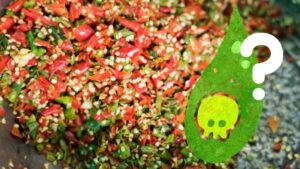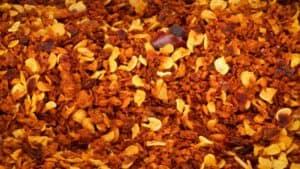Does your mouth feel like it’s on fire after eating spicy Buffalo wings or extra hot salsa? And do those beloved fiery foods also make you uncontrollably hiccup? If so, you’re definitely not alone. Many
But what exactly is the connection between chili peppers and your diaphragm freaking out? The theories may surprise you. Experts suggest that irritating compounds like capsaicin can overstimulate nerves in your esophagus, which communicate with the muscle controlling your breathing – the diaphragm. This may cause it to spasm involuntarily, resulting in rhythmic hiccups.
Other possibilities relate to how spicy ingredients interact with existing digestive issues like reflux and gas, or how they slow down stomach emptying. Let’s explore the science behind why your favorite dishes make you hiccup, plus tips to prevent and stop this annoying phenomenon.
Understanding the mechanisms behind
What Are Hiccups?

Before examining why eating spicy dishes in particular sets them off, let’s first understand what hiccups actually are.
Hiccups occur when your diaphragm, the large muscle separating your chest from your abdomen, involuntarily contracts.
With each hiccup, your diaphragm spasms and momentarily limits your ability to breathe. The classic “hic” sound results from air rushing in as your vocal cords snap shut.
While occasional hiccups are harmless, extended attacks can be uncomfortable. And unfortunately, the causes of both acute and chronic hiccups aren’t always clear.
Spicy food is just one of many possible hiccup triggers. Others include carbonated beverages, excitement or emotions, irritation from reflux, and rapid eating or drinking.
How Might Spicy Food Provoke Hiccups?
So what is it about chili peppers and other hot spices that could instigate hiccupping in susceptible people? A few theories exist:
Irritation of the Esophagus
Your esophagus connects your throat to your stomach. This muscular tube moves food you swallow down to your gut.
The interior of the esophagus contains sensory nerves that detect pain, temperature, and irritation. These nerves communicate with your vagus nerve, which influences diaphragm function.
When you consume spicy foods containing capsaicin, this compound can activate the esophageal nerves, making them fire more rapidly. Experts suspect this irritation could indirectly trigger the vagus nerve to spasm, provoking hiccups.
Aggravation of Reflux
For those with gastroesophageal reflux disease (GERD) and other conditions causing heartburn, spicy foods can exacerbate symptoms.
Reflux of stomach acid into the esophagus aggravates nerves, potentially prompting hiccups along with other issues like burning chest pain. So
Unwelcome Gas and Bloating
Many people pair spicy meals with carbonated drinks. This combo is a double-whammy for trapped gas and bloating, which themselves disrupt diaphragm contractions and prompt hiccups.
The ingredients in spicy dishes may also cause tummy troubles that generate excess gas, compounding the effect. It’s a recipe for painful
Delayed Stomach Emptying
Studies show that capsaicin and other pepper compounds can temporarily slow digestion, meaning food stays in the stomach longer after spicy meals.
This extended fullness presses on the diaphragm, which could interfere with its regular rhythmic movements and lead to contractions we experience as hiccups.
Tips To Prevent Spicy Food Hiccups
While more research on preventing hiccups is needed, some proactive steps may help if spicy dishes consistently make you hiccup.
- Avoid overeating – Smaller portions of spicy foods may reduce chances of hiccups and other stomach troubles.
- Say no to carbonated beverages – The bubbles in soda can increase swallowed air and bloating.
- Have anti-gas foods – Ingredients like ginger and fennel can help relieve gas-related irritation.
- Check for reflux – See a doctor if you regularly have heartburn with spicy food. Medication may help.
- Eat slowly and chew thoroughly – This gives your body more time to process the
spice components. - Stay well-hydrated – Fluids help digest spicy foods and prevent dry throat irritation.
Making proactive adjustments like these when enjoying spicy cuisine may keep resulting hiccups at bay or at least minimize their longevity and impact.
Tricks To Stop Spicy Food Hiccups
When preventive measures fail and you find yourself with a case of the post-spice hiccups, don’t panic. While not scientifically-proven, some anecdotal tactics may offer relief:
- Sip icy water to soothe your throat. Avoid large gulps.
- Hold your breath as long as comfortably possible. This temporarily halts erratic diaphragm contractions.
- Breathe slowly into a paper bag. Inhaling concentrated carbon dioxide may inhibit hiccup reflexes.
- Massage around your diaphragm to relax the muscle.
- Gargle with honey to coat and calm irritation in your throat.
- Distract yourself with an immersive activity to disrupt hiccupping reflexes.
- Remain upright for easier breathing.
- Accept that the hiccups will pass eventually. Don’t obsess over stopping them.
See a doctor promptly if hiccup attacks don’t subside after 48 hours or become severely painful.
When To Avoid Spicy Foods
While an annoyance, sporadic hiccups from spicy meals are nothing to worry about for most people. But those with certain conditions may need to minimize their hot, peppery food intake.
Individuals prone to hiccups including:
- Those with chronic reflux, ulcers, or frequent heartburn
- People with sensitive digestive systems
- Individuals taking muscle relaxants or painkillers
- Those susceptible to gas and bloating
If fiery foods frequently trigger extended hiccup episodes, avoid them or speak to your doctor about allergy testing or other ways to make them more tolerable.
The Delicious World of Spice
For
Understanding exactly why your body reacts to capsaicin-filled dishes with abrupt diaphragm spasms takes the frustration out of this quirky phenomenon. Next time your chicken wings or extra hot salsa bring on a case of the hiccups, hopefully you’ll just smile through the temporary annoyance!




